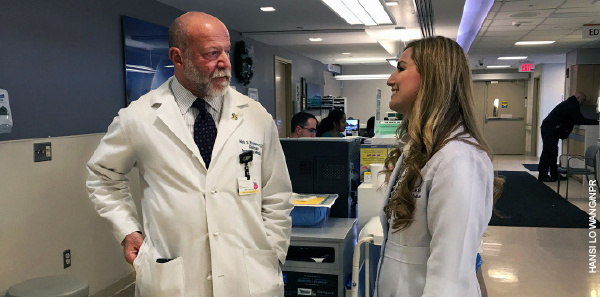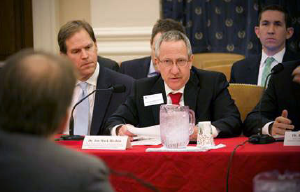
ACEP leadership and staff works every day to make change at the highest levels that will affect all levels of your practice. Catch up on what leadership has done for you lately in the Leadership Report.
Explore This Issue
ACEP Now: Vol 37 – No 04 – April 2018ACEP Board of Directors member Mark S. Rosenberg, DO, MBA, FACEP, has been appointed to the Department of Health and Human Services (HHS) Pain Management Best Practices Inter-Agency Task Force (PTMF). The PTMF was created to determine whether there are gaps or inconsistencies in pain management best practices among federal agencies and propose recommendations for addressing identified gaps and/or inconsistencies.
ACEP and the Centers for Medicare and Medicaid Services (CMS) Center for Clinical Standards and Quality (CCSQ) met on March 1 to discuss quality measures policy, process, and the future vision for CMS’ approach to meaningful measures. The meeting was very productive and provided insight to the ACEP team in preparation for developing the next generation of quality measures, validating existing measures, and assessing their applicability to ACEP’s Quality Clinical Data Registry, known as Clinical Emergency Data Registry (CEDR).
Laura Wooster, ACEP’s associate executive director of public affairs, represented ACEP in a day-long meeting in Washington, D.C., held by HHS’ Assistant Secretary for Preparedness and Response, Robert Kadlec, MD, to gain stakeholder input on how to implement his vision for a national medical disaster system. Dr. Kadlec will be sharing more on this vision when he joins ACEP‘s Public Policy Town Hall during the Leadership and Advocacy Conference on May 21.

Dr. Jon Mark Hirshon, a member of ACEP’s Board of Directors, speaking at the House Ways and Means Health Subcommittee.
ACEP
ACEP Board member Jon Mark Hirshon MD, PhD, MPH, FACEP, participated in a roundtable held by the House Ways & Means Health Subcommittee on its “Red Tape Initiative” to reduce provider administrative burdens. Dr. Hirshon talked about administrative burdens in the Medicare program that impact emergency physicians and provided recommendations for addressing them.
ACEP joined with the American Hospital Association and the American College of Radiology in a joint letter to Anthem Chief Clinical Officer Craig Sammit, MD, to state concerns with the insurer’s policy retroactively denying coverage for emergency visits it deems as non-emergent. ACEP also has worked closely on the Anthem issue with Senators Ben Cardin of Maryland and Claire McCaskill of Missouri, who wrote a joint letter to HHS Secretary Alex Azar and Department of Labor Secretary Alexander Acosta expressing concerns about the Anthem policy and seeking information on whether it violates federal laws or regulations.
Two emergency medicine opioid bills that ACEP was heavily involved in developing were recently introduced in Congress. The “Alternatives to Opioids (ALTO) in the Emergency Department Act” would provide $30 million (over three years) to establish a demonstration program to nationally test the ALTO protocol developed at St. Joseph’s Regional Medical in Paterson, New Jersey, by Dr. Rosenberg and Alexis M. LaPietra, DO, medical director of emergency medicine pain management at St. Joseph’s. The program uses alternative pain management protocols to limit the use of opioids in the emergency department. Additionally, the “Preventing Overdoses While in Emergency Rooms (POWER) Act” would provide $50 million (over five years) in grants to establish policies and procedures for administering medication-assisted treatment (MAT) in the emergency department to opioid overdose patients with subsequent referral to community providers.
ACEP President, Paul Kivela, MD, MBA, FACEP, was formally invited by the National Academy of Sciences (NAS) to participate in a panel to discuss “Leading Changes at the Ground Level” of clinical medicine/healthcare administration at the workshop titled, “Engaging the Private Sector Health Care System in Building Capacity to Respond to Threats to the Public’s Health and National Security.” Dr. Kivela worked with ACEP‘s EMS and Disaster Sections for his discussions.
Pages: 1 2 | Multi-Page





No Responses to “How Is ACEP Directly Affecting Your Practice?”